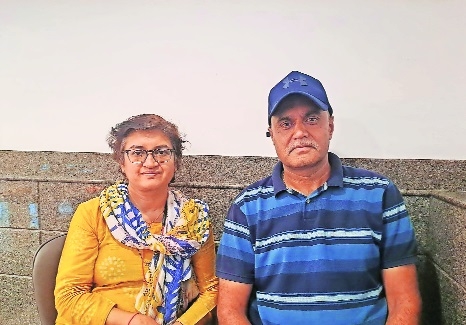25 Yearsof Kargil Victory A Recall ‘The engineers’ task continued after ceasefire too’
| Date :22-Jul-2024 |

Col Rajesh Kulkarni, Sena Medal, with his wife Aarti during their recent visit to Nagpur.
By Kartik Lokhande :
On July 26, 1999, ceasefire was declared and the enemy started vacating the posts/heights that they had occupied in Drass, Batalik etc. However, for engineers in the Indian Army, end of the Kargil War marked the beginning of another important task -- of creating infrastructure at the challenging heights to ensure that Indian troops stayed put all through the year defending the positions from the enemy.
These operations continued for more than a year thereafter for the engineers, says Col Rajesh Kulkarni. The entire 8 Mountain Division was inducted to replace a brigade in Kargil Sector. A lot of infrastructure was to be constructed to accomodate troops in a very short time, before the winter set in.
“We had special tasks
including clearing of mines, track construction, launching of bridges, water supply, electricity supply etc in a stipulated time-frame because the heights we had recaptured had to be sanitised and manned during winters too. We could reach several posts after an arduous walk of over two days. Construction at the posts was difficult as weather would not permit long working hours.
Men had to work in sub-zero temperatures even during day hours.We had to maintain morale of the men as everyone wanted to go home after the war was over. The task was enormous,” says the man decorated with Sena Medal.
In Drass, 108 Engineer Regiment were tasked to set up Brigade Headquarters at a new location and accomodation for special units. It was set up at the base of Tololing. Towards the end of the tenure, the regiment was tasked to construct a war memorial at Bimbat to honour the fallen soldiers of the Division. “I am proud to have been a part of 108 Shatrunashees. My regiment was part of 1971 War and Kargil War, and got two unit citations, two battle honours, and two theatre honours,” Col Kulkarni mentions with pride.
Asked what has changed in 25 years since Kargil War of 1999, Col Kulkarni replies, “We are better prepared realistically. A lot has been invested in training of men, modernisation of machines, improvement in infrastructure, food, clothing etc.”
Apart from Col Kulkarni, another engineer officer of the Indian Army who got gallantry medal (Shaurya Chakra) is Col Rupesh Pradhan from 2 Engineer Regiment. With Col Kulkarni, his team-members namely JCO Swarn Singh and Sapper Laxman Chate also got Sena Medals.
Tough times refined us: Aarti Kulkarni
“Kargil War was certainly a rough start but it definitely laid a strong foundation and refined us as human beings,” says Aarti Kulkarni, the better-half of Col Rajesh Kulkarni, Sena Medal.
The lady wearing a gentle smile recalls that they married in March 1999, moved to Srinagar in April 1999. When Lt Rajesh Kulkarni proceeded on an operation for a few days, no one knew that he would return only after a year. The entire unit had moved towards Drass in batches in days to follow. The war news had started pouring in on television. Since the downward movement of vehicles from Srinagar to Jammu was closed, she couldn’t go home and got stuck for two months in the Old Air Field Cantonment in Srinagar. Civil flight operations also were curtailed.
“It was a testing time. I was alone. No family support, no friends, no mobile phones. There was only one telephone booth in the Cantonment. Family couldn’t contact me. I had to wait in a long queue at the booth to contact family.
In those days, Rajesh could contact me only twice, say for five
minutes. You can understand how a newly-wed girl would have felt in such a situation,” recalls Aarti with memories of those days making her voice tense for a few moments.
Soon, black-out (no lights after 6 pm) was declared in the Cantonment as it was adjacent to the Air Force Station. She adds, “I used to sit in candle light. The most difficult moments were those of hearing the news about the loss of our brave soldiers. The Tiranga-clad coffin used to flash in front of eyes. Each day was challenging. Food used to come from ‘langar’. I used to pray for courage and strength for all our soldiers. My faith couldn’t remove the fear and pain, but it got me through the tough times.”
After 25 years, reflecting upon the past, Aarti Kulkarni says that people are not permitted to select plans for their destiny but her destiny taught her a few invaluable lessons of life like the value of human life and value of relationships. “Many people say to Rajesh, you are lucky to have participated in the Kargil War. Indeed. Today, we feel that tough times refined us. We are the chosen ones, the blessed ones!” she observes.